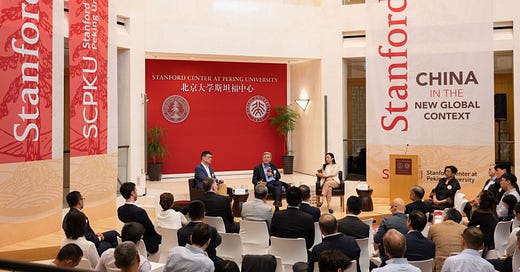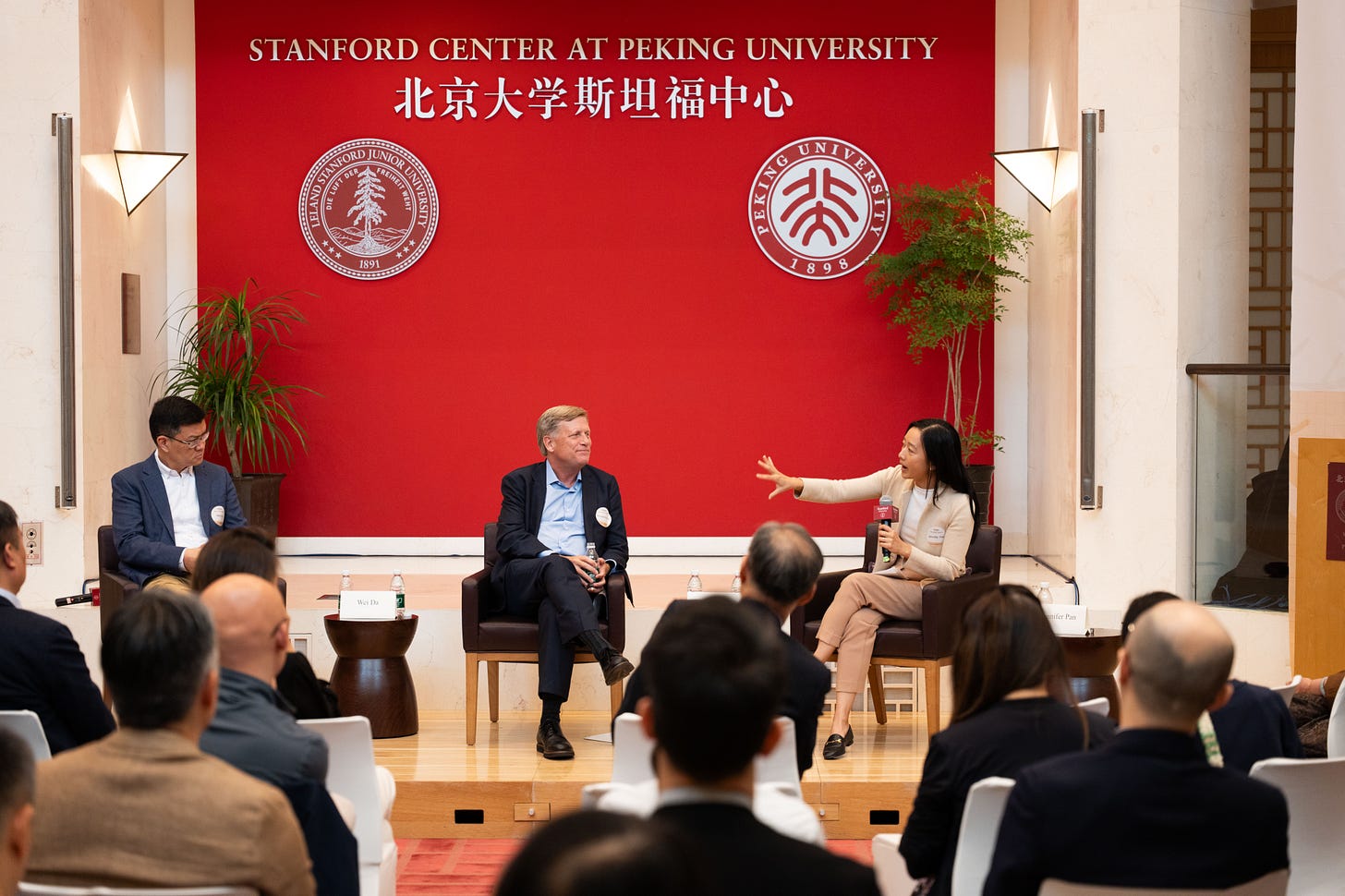Why Trump Is So Popular in China
That so many in China are pleased with Trump’s foreign policy initiatives should make us worry.
I spent last week in Beijing. My primary purpose there was to speak at a conference on China in the New Global Context, hosted by the Stanford Center at Peking University (read more about SCPKU here). But I stayed on several extra days to meet with other academics, entrepreneurs, and students to discuss US-China relations in the second Trump administration. My main takeaway: Trump has been good for CCP General Secretary Xi Jinping.
That was not the assessment I expected to hear. I was prepared to listen to long speeches about how Trump’s return to power had escalated conflict between the United States and China. Instead, the central message I heard from both Xi’s supporters and critics was how Trump’s tariffs have united Chinese society in support of Xi and his government. The tariff levels initially proposed by Trump were so outlandishly high that the Communist Party of China could easily frame them as anti-Chinese. Tariffs produced a rallying-around-the-flag effect in Chinese society, which reminded me of the unity we witnessed in American society after the September 11, 2001, terrorist attacks. One of my Chinese interlocutors portrayed the tariffs as a lifeline for Xi. Long before Trump’s new tariffs, the Chinese economy had been slowing down. Liberal economists in China, as well as some successful Chinese entrepreneurs, blamed Xi’s anti-market policies for the declining growth rates. But today, Trump is the new scapegoat. Even memes in Chinese social media, not generated by the Communist Party of China, playfully portray Trump as the one “making China great again.” Here are some of the memes that were floating on social media when I was in Beijing last week:

Of course, everyone I met last week was relieved by the successful negotiations in Geneva between American and Chinese officials to suspend the draconian level tariffs for 90 days, even though the 30 percent tariffs that remain in place are still very high. On the Chinese side, those negotiations were led by Vice Premier He Lifeng, who many described to me as being very close to the “paramount leader” (yes, people in China use that phrase when describing Xi) and hoped that the same could be said about the head of the US delegation, Treasury Secretary Scott Bessent. I replied honestly that I did not know whether Bessent could become the go-to channel for all high-level communications between the Trump and Xi governments on all bilateral issues. Many lamented that such a channel does not currently exist. Notably, Trump and Xi have spoken only once since Trump’s reelection. The connectivity between our two governments is dangerously thin. (I talked about that fact at Remin University in a public event reported on here.)
The new U.S. Ambassador to China, David Perdue, reported for duty while I was in town, and there was much excitement about his arrival (watch his introductory video here). But everyone I met also yearned for the appointment of a senior, experienced China hand with close ties to Trump. I doubt such an appointment is likely to occur.
A few people I met also explained to me that the era of the U.S. being the central subject of Chinese foreign policy was over. They suggested that Xi was not in a hurry to speak with Trump, as there was not much to discuss. Instead, Xi was focused on capitalizing on Trump’s withdrawal from the world stage to expand China's connections worldwide. I was asked to explain the logic for drastically reducing funding for the U.S. Agency for International Development. I could not. China is not cutting down its foreign assistance budgets.
In fact, during my visit to Beijing, several Latin American leaders were also in town to participate in the 4th China-CELAC Forum. Lula da Silva from Brazil was there. Gabriel Boric from Chile attended. So too did Gustavo Petro from Colombia, who also formally joined Xi’s Belt and Road Initiative (BRI) while in Beijing. I was especially struck by the symbolism of this event—Colombia was once a very close partner of the United States. As Trump disengages with the world, Xi is doubling down on engagement, including in Washington’s backyard.
And that was my other big takeaway. More than ever before, I came home worried that we, as Americans, lack the will or strategy to compete with China. At one lunch in Beijing, I heard a long testimonial from a former Chinese government official about how he learned English by listening to the Voice of America during the Cultural Revolution. It was my strong impression that those radio broadcasts helped shape his pro-American and pro-market views. Yet, Trump has shut down Voice of America in his first 100 days.
On this trip, I visited three universities. Today, none of them are being defunded like ours. During a visit to Renmin University of China, I learned about a new leadership program designed to recruit mid-career political leaders to pursue their PhDs at the university. That sounded like a brilliant soft-power instrument. What is Trump’s counter to that? Suspending visas to international students? (Thankfully, that policy was reversed, but the anxiety triggered by the act will mean fewer international students coming to the United States next year.) Banning international students from enrolling at Harvard? In Trump’s America, we are doing the exact opposite; we are cutting funding for our student exchange programs and universities more broadly. Had Trump’s anti-foreign student policies been in place decades ago, Oxford grad Elon Musk would have built Tesla in the United Kingdom, Tsinghua University alum Jensen Huang would have built Nvidia in the People’s Republic of China or Taiwan, and Moscow State University grad Sergei Brin would have built Google in Russia.
As I argue in my next book, Autocrats versus Democrats, I still remain optimistic about America’s ability to compete with China and Russia over the long haul. But doing so will require some rethinking of old practices and abandonment of many new Trump policies. That so many in China are pleased with Trump’s foreign policy initiatives should make us worry.







I see that a Judge issued today a temporary stay on the executive order banning visas for foreign students at Harvard. Would love to hear more about any impacts on Stanford that has produced so many graduates like Elon Musk and other technological pioneers. I see some resemblance between what Trump is doing to the Chinese "cultural revolution." Ours is really a counter cultural revolution against science, medicine, law and higher education generally. It is disturbing to have Scott Bessent and even more alarmingly Steve Witkoff serving as principal ambassadors when they are patently unqualified to serve in those roles. I live in Palm Beach County and Witkoff is known here for developing golf course communities for the uber wealthy. The initiation fee for the one in Palm Beach County is $500K and his new one in Dade County has an initiation fee of $1 million. There is no room in the Trump diplomatic corps for people like former ambassadors George Kennan and Michael McFaul.
I am writing from "across the street" at Tsinghua University. Professors here are under no illusions with respect to our president or the present world situation. Students here are buried in their work and a bit unaware. I greatly appreciate your work and your insights.